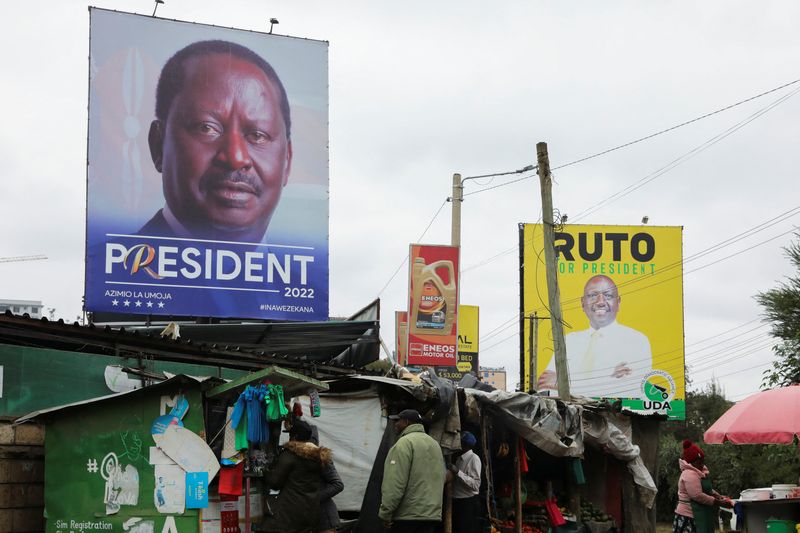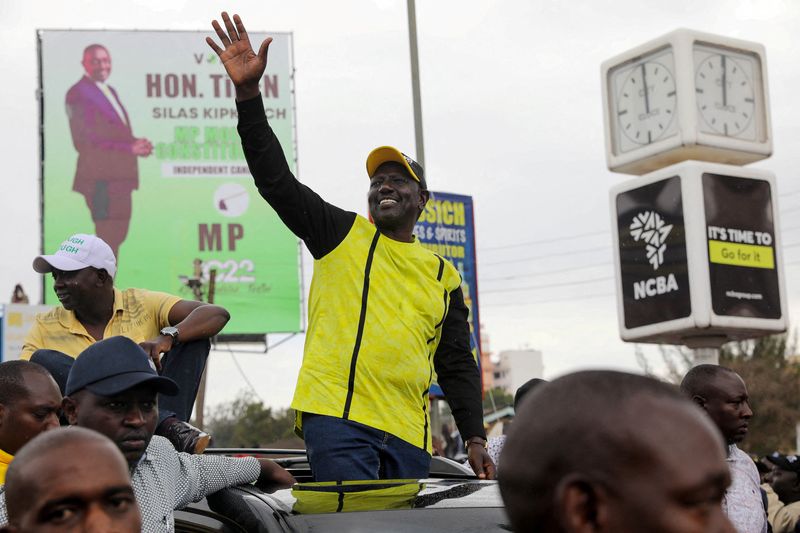By Ayenat Mersie and Katharine Houreld
NAIROBI (Reuters) - East Africa's economic powerhouse will hold elections on Aug. 9 to select a new president, parliament, county governors and assemblies. President Uhuru Kenyatta will be stepping down after serving his constitutionally allowed 10 years.
Many voters want change, frustrated by corruption and skyrocketing prices. But both frontrunners vying to succeed Kenyatta have ties to him.
Veteran opposition leader Raila Odinga has received Kenyatta's endorsement. William Ruto has been Kenyatta's deputy president for the past decade, although the two men fell out.
Odinga, a left-leaning former political prisoner, has served as prime minister and is the son of the nation's first vice president.
Ruto, a gifted orator who says he once sold chicken by the roadside, has portrayed the election as a fight between common "hustlers" and elite "dynasties".
Both are wooing voters in East Africa's richest and most stable nation by promising to reign in ballooning foreign borrowing and help the poor. Less than 0.1% of Kenyans own more wealth than the bottom 99.9% combined, according to Oxfam. The global spike in fuel and food prices has hit families hard.
The candidates have also stitched together alliances of ethnic voting blocs. Such ethnic rivalries led to deadly violence in previous elections after results were disputed.
But unlike the past four elections, Kenyatta's Kikuyu ethnic group, the nation's largest, has no presidential candidate to unify behind. Both Odinga and Ruto have chosen Kikuyu vice-presidential running mates.
The potential fracturing of Kenya's biggest ethnic voting bloc makes for an unpredictable election, said Murithi Mutiga, Africa head for global think tank International Crisis Group.
"The public has grown weary of all the byzantine alliances among the political elites," he said. "Politicians are being forced to discuss issues that really matter."
Young citizens are particularly disenchanted, he said; many have not bothered registering to vote.
VOTER APATHY
Those are Kenyans like 30-year-old motorbike taxi driver Calvince Okumu, who falls into a demographic courted by both camps.
He is one of the country's 1.6 million motorcycle taxi drivers – the kind of young, hardscrabble entrepreneur Ruto promises to give loans to. He also hails from Western Kenya, Odinga's stronghold, and could benefit from his promise to provide a basic income to the poorest families.
He's not interested.
"Why should I line up for four hours to vote?" asked Okumu, a part-time student. "There's no difference between the two."
The number of registered voters aged 18-34 has dropped more than 5 percent since the 2017 election, despite population growth of around 12 percent.
Okumu's more concerned about finding steady work. More than a tenth of Kenyans aged 18 - 64 are unemployed and nearly one in five are out of the labor force - meaning they are not looking for work, according to the World Bank.
Endemic corruption has also angered voters; both camps include officials charged with or even convicted of corruption.
In the northeast, the worst drought in 40 years has forced parched grazing lands and forced 4.1 million people to depend on food aid. Their plight has barely been mentioned as would-be leaders buzzed across the country in fleets of helicopters.
UNREST
The shadow of the violence following disputed 2007 elections, which killed 1,200 people and displaced around 600,000, hangs over each election cycle.
Kenyatta and Ruto were among six Kenyans charged at the International Criminal Court over their alleged roles in the 2007 violence. Both denied the charges and their cases collapsed.

Violence also followed the 2017 polls, when more than 100 people were killed.
This time, there's been less pre-election violence; communities are working hard to defuse tensions. The Supreme Court's decision to nullify and re-run the last election also means there's higher confidence in the justice system - so disputes are more likely to go to the courts than the streets.
